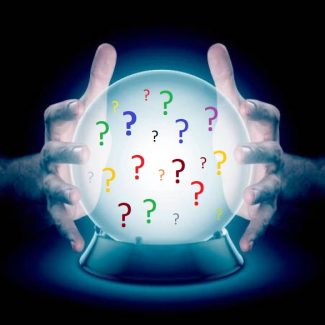
OTHER WINNING TECHNOLOGIES BETWEEN PRESENT AND FUTURE
We resume the forecasts of MIT (Massachussets Institute of Technology in Boston), reporting the second part of the list of technologies that could revolutionize our lifestyle habits in the near future. I remind you that this list, divided into two groups for display convenience, is based on 10 emerging technological areas and is proposed below in an order of importance linked above all to personal interest and therefore purely subjective:
GPT-3 – Artificial Intelligence has an extreme need to interact with the whole surrounding environment; therefore the realization of some specialized computer models for writing, speaking and reading in natural language is already the present. GPT-3 is currently the most educated, as it is trained through the reading of thousands of books and texts, including on the internet. The machine learning AI does not yet allow it a complete understanding of the texts and this will be the goal that researchers will set themselves in the near future, even if it is already able to create texts of considerable complexity and strong realism.
Hyper-accurate positioning – GPS, which we use every day, has transformed our lives and many of our businesses. But while today’s GPS is accurate to within 5 to 10 meters, new hyper-accurate positioning technologies have accuracies within a few centimeters or millimeters. That’s opening up new possibilities: from landslide warnings to delivery robots and self-driving cars, that can safely navigate streets. A practical example is China’s current BeiDou (Big Dipper) global navigation system. It was completed in June 2020 and is part of what is making all this possible. It provides positioning accuracy of 1.5 to two meters to anyone. Using ground-based augmentation, it can get down to millimeter-level accuracy. Meanwhile, classic GPS, which has been around since the early 1990s, is getting an upgrade: four new satellites for GPS III have recently been launched in orbit and more are expected by 2023.
Multi-skilled artificial intelligence – Despite the immense progress made by artificial intelligence in recent years, AI and robots are still dumb in many ways, especially when it comes to solving new problems or navigating unfamiliar environments. They lack the human ability, found even in young children, to learn how the world works and apply that general knowledge to new situations. A promising approach to improving AI capabilities is to expand its “senses”. Currently an artificial intelligence, equipped with digital vision and audio recognition, can understand things but cannot talk about what it sees and hears using natural language algorithms. The challenge of the near future is to combine all these skills into a single artificial intelligence system. These complete systems could begin to use human-like intelligence. Furthermore, a robot – able to see, hear, feel and communicate – could certainly be a more interesting and productive human assistant than current specialized robots.
Data trust – Tech companies have proven to be poor stewards of our personal data. Our information has unfortunately been leaked, hacked, sold and resold multiple times. Maybe the problem is not with us, but with the model of privacy we have long adhered, on in which we, as individuals, are primarily responsible for managing and protecting our own privacy. Data trusts offer an alternative approach, that some governments are starting to explore. A data trust is a legal entity that collects and manages personal data on their behalf. Though the structure and function of these trusts are still being defined, and many questions remain, data trusts are notable for offering a potential solution to long-standing problems in privacy and security.
Remote everyrhing – The pandemic has forced the world to go remote. Our work, health care and education have been the areas most affected by remote approach. Most of us have experienced work-from-home, exchanged emails and medical reports with remote healthcare centers, experimented with remote teaching, both personally for training and through our children for school teaching. Now it is not possible to go back: work-from-home has entered by law into employment contracts, meetings and contacts/job interviews are generally held online, distance learning has become a valid and ecological alternative to that in presence, telehealth is a modality of common use and it is considered necessary, particularly in countries where there is a chronic lack of doctors or long distances between the health center and the patient.
The future is therefore already the present, we just need to realize it.
ACTION ICT (January 2022)
ACTION ICT is a young, dynamic and innovative IT company. It operates, both nationally and internationally, offering professional skills and design solutions in the ICT field to medium and large businesses. Our highly skilled know-how is housed in three expertise specific departments: ACTION DATA (Big Data Analytics and Artificial Intelligence), ACTION APP (Web & Mobile Application) and ACTION IOT (Internet of Things and Robotics).
Keep in touch
Latest
-
 Stage Mirror Approach…
Stage Mirror Approach…
-
 The Distinction Between…
The Distinction Between…
-
 FROM LANGUAGES TO…
FROM LANGUAGES TO…
-
 A LITTLE “NETIQUETTE”…
A LITTLE “NETIQUETTE”…
-
 A LITTLE ATTENTION…
A LITTLE ATTENTION…
-
 REMOTE WORKING: PROS…
REMOTE WORKING: PROS…
-
 OTHER WINNING TECHNOLOGIES…
OTHER WINNING TECHNOLOGIES…
-
 WINNING TECHNOLOGIES BETWEEN…
WINNING TECHNOLOGIES BETWEEN…
-
 ACTION ICT PARTICIPATES…
ACTION ICT PARTICIPATES…
-
 SUCCESS MANAGER: 2…
SUCCESS MANAGER: 2…
-
 CYBERSECURITY: WHAT YOU…
CYBERSECURITY: WHAT YOU…
-
 LEADER & INFLUENCER…
LEADER & INFLUENCER…
-
 PROJECTS & PARTNERSHIPS:…
PROJECTS & PARTNERSHIPS:…
-
 WE ARE ALWAYS…
WE ARE ALWAYS…
-
 PROJECTS & PARTNERSHIPS:…
PROJECTS & PARTNERSHIPS:…
-
 OPEN SOURCE ……
OPEN SOURCE ……
-
 ACTION ICT OPENS…
ACTION ICT OPENS…
-
 PROJECTS & PARTNERSHIPS:…
PROJECTS & PARTNERSHIPS:…
-
 PROJECTS & PARTNERSHIPS:…
PROJECTS & PARTNERSHIPS:…
-
 INNOVATIVE ICT PROJECTS:…
INNOVATIVE ICT PROJECTS:…
-
 PROJECTS & PARTNERSHIPS:…
PROJECTS & PARTNERSHIPS:…
-
 ECOLOGY: THINKING BIG,…
ECOLOGY: THINKING BIG,…
-
 BIG DATA ANALYTICS…
BIG DATA ANALYTICS…
-
 LARGE ITALIAN COMPANIES…
LARGE ITALIAN COMPANIES…
-
 ARTIFICIAL INTELLIGENCE AND…
ARTIFICIAL INTELLIGENCE AND…
-
 BIG DATA and…
BIG DATA and…
-
 THE HIDDEN FACE…
THE HIDDEN FACE…
-
 SCHUBERT and ARTIFICIAL…
SCHUBERT and ARTIFICIAL…
-
 ARTIFICIAL INTELLIGENCE vs…
ARTIFICIAL INTELLIGENCE vs…
-
 ARTIFICIAL INTELLIGENCE AT…
ARTIFICIAL INTELLIGENCE AT…
-
 MACRO OFFER AREAS…
MACRO OFFER AREAS…
-
 NECESSARY PROFESSIONAL FIGURES…
NECESSARY PROFESSIONAL FIGURES…
-
 THE NEW CHALLENGES…
THE NEW CHALLENGES…












